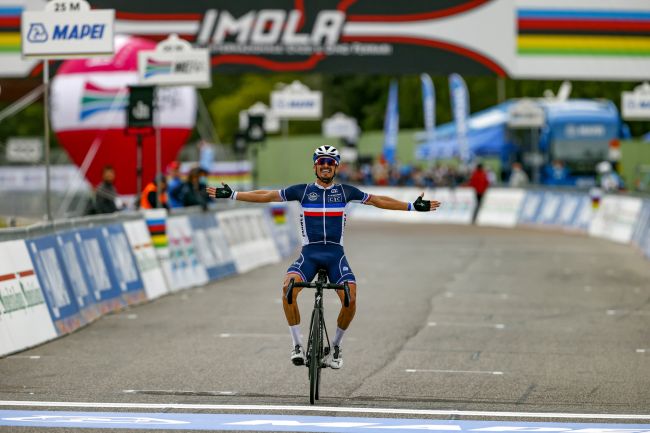Julian Alaphilippe (Francia) consiguió el título mundial de élite masculino en ruta en el Campeonato Mundial de Ruta UCI después de un ataque bien calculado y un final espectacular en el circuito de carreras de Imola. El francés atacó en la última subida de la carrera de la Cima Gallisterna con 12 km para el final y estableció una pequeña ventaja sobre un grupo de persecución de clase mundial, y a pesar de una persecución frenética, el francés se mantuvo para ganar.
En el sprint por el segundo lugar, Wout Van Aert (Bélgica) tenía demasiado poder para Marc Hirschi (Suiza), mientras que Michal Kwiatkowski (Polonia) se vio obligado a conformarse con el cuarto lugar por el margen más estrecho.
«En este momento es realmente difícil decir algo», dijo Alaphilippe en una entrevista posterior a la carrera. «Quiero agradecer a todos mis compañeros de equipo que realmente creen en mí hoy. Todos hicieron un gran trabajo. Fue un sueño de mi carrera. A veces, estuve tan cerca y nunca estuve en el podio. Vine aquí con mucha ambición y es un día de ensueño para mí «.
Como estaba previsto, la carrera llegó a la Cima Gallisterna con la subida final de la carrera con un grupo de 25 corredores abordar juntos las pistas inferiores. Con una ventaja numérica, Bélgica colocó al campeón olímpico Greg Van Avermaet en la parte delantera, y el veterano piloto marcó un ritmo tan fuerte que pocos pudieron igualarlo. Fue la revelación del Tour de Francia, Hirschi, quien rompió el dominio belga primero, con 12,9 km para el final, con Van Aert rápidamente al volante y un grupo de alrededor de ocho ciclistas, incluido Alaphilippe, que se alejaba. Cuando Hirschi se hizo a un lado, Kwiatkowski desató un segundo ataque, y esta vez solo un puñado de rivales pudo mantener contacto con Van Aert, Hirschi, Primoz Roglič, Jakob Fuglsang, Alaphilippe y todavía en el redil.
En una escena similar a un final de Milán-San Remo, Alaphilippe se pegó al volante de Kwiatkowski antes de saltar con la cima a la vista. Fuglsang fue posiblemente el jinete más fuerte que quedó atrás en ese momento, pero fue atrapado hacia la parte de atrás del grupo. En el largo descenso, el francés estableció una ligera ventaja de ocho segundos sobre Fuglsang, Van Aert, Roglic, Hirschi y Kwiatkowski mientras los sufridos perseguidores luchaban por mantenerse en la contienda. Los kilómetros finales parecieron una tortura para el francés mientras luchaba contra cada aceleración por detrás, respondiendo cada vez que su ventaja bajaba a menos de diez segundos, pero incluso cuando ingresaba al circuito de carreras por última vez, podía escanear para ver a sus perseguidores en caliente. búsqueda. Estaba demasiado cerca para llamar hasta que finalmente, cuando la pendiente se convirtió en una ligera bajada, Alaphilippe pudo saborear su primer título mundial en ruta, y el primero de Francia desde Laurent Brochard en 1997.
Michael Matthews (Australia) llevó a casa al siguiente grupo en la carretera en séptimo lugar.

Julian Alaphilippe (France) stormed to the men’s elite road world title at the UCI Road World Championships after a well-calculated attack and a dramatic finish on the Imola motor racing circuit. The Frenchman attacked on the final climb of the race of the Cima Gallisterna with 12km to go and established a slim advantage over a world-class chase group, and despite a frantic chase the Frenchman held on to win.
In the sprint for second, Wout Van Aert (Belgium) had far too much power for Marc Hirschi (Switzerland), while Michal Kwiatkowski (Poland) was forced to settle for fourth by the narrowest of margins.
«For this moment it’s really hard to say something,» Alaphilippe said in a post-race interview. «I want to say thank you to all my teammates who really believe in me today. Everybody did a great job. It was a dream of my career. Sometimes, I was so close, and I was never on the podium. I came here with a lot of ambition and it’s just a dream day for me.»
As predicted, the race came down to the Cima Gallisterna with the final climb of the race seeing a group of 25 riders tackle the lower slopes together. With a numerical advantage, Belgium positioned Olympic champion Greg Van Avermaet on the front, with the veteran rider setting a pace so strong that few could match him. It was Tour de France revelation Hirschi who broke the Belgian stranglehold first – with 12.9km to go – with Van Aert quickly on his wheel and a group of around eight riders, including Alaphilippe, moving clear. When Hirschi pulled to one side, Kwiatkowski unleashed a second attack, and this time only a handful of rivals could maintain contact with, Van Aert, Hirschi, Primoz Roglič, Jakob Fuglsang, Alaphilippe and still in the fold.
In a scene similar to a Milan-San Remo finish, Alaphilippe stuck to Kwiatkowski’s wheel before jumping clear with the summit in sight. Fuglsang was possibly the strongest rider left behind at that point but he was caught towards the back of the group. On the long descent, the Frenchman established a slim eight-second lead over Fuglsang, Van Aert, Roglic, Hirschi and Kwiatkowski as the suffering chasers battled to remain in contention. The final kilometres looked like torture for the Frenchman as he fought off each acceleration from behind, responding whenever his lead dipped under ten seconds, but even when he entered the motor racing circuit for the final time he could scan back to see his chasers in hot pursuit. It was too close to call until finally, as the gradient eased into a slight downhill, Alaphilippe could savour his first road world title, and France’s first since Laurent Brochard in 1997.
Michael Matthews (Australia) brought home the next group on the road in seventh place.
cyclingnews.com


